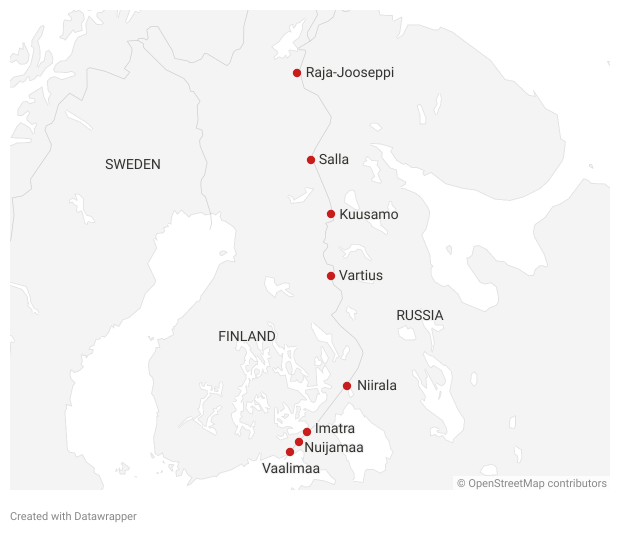Finland’s president confirms controversial deportation law

Under certain circumstances, the law allows for border authorities to refuse to accept asylum applications at border crossings and to return asylum seekers who have entered the country.
Today, July 16, Finnish President, Alexander Stubb, approved the bill for the Act on Temporary Measures to Combat Instrumentalised Migration.
The so called deportation law allows the government and the president to jointly decide to temporarily suspend asylum applications at Finland’s 1300 km long eastern border to Russia.
When instrumentalised migration is suspected to happen, border authorities can refuse to accept asylum applications. People who have already entered the country will be returned to to the Russian side without any right to appeal, and they will be advised on where they can apply for asylum.
The emergency law is in effect for one year and can be applied for one month at a time and only to a limited part of the Finnish border and its vicinity. A prerequisite is that Finland’s sovereignty and security are deemed threatened.
The contentious bill was debated during several plenary sessions over the past months.
On Friday July 12, the parliament passed the legislation by 167 votes to 31, thus receiving the required five-sixths majority.
The law will come into effect next Monday, July 22.
Response to instrumentalised migration
The law is as a response to Russia’s tactic of instrumentalised migration, a hybrid operation deliberately directing asylum seekers to Finland’s eastern border crossings.
From August 2023 and onwards an increased amount of asylum seekers from Russia began arriving at Finnish border crossings on bicycles.
Based on observations and information received from the border guards and other authorities, it became clear that Russia had facilitated these individuals in crossing the border into Finland.

In November 2023 the authorities started to temporarily close the majority of the eastern border stations. Approximately one month later, in mid-December, all stations along the eastern border were temporarily closed.
The new law will will eventually allow for the eastern border crossings to be opened to traffic again.
Vulnerable individuals must be accepted
Asylum applications must still be accepted, on a case-by-case basis, if the border guard assesses it is necessary to protect the rights of a child, a disabled person, or another particularly vulnerable individual.
The border guards will be trained in profiling and assessing factors such as age and the risk of the person being persecuted in Russia.
Concerns have been raised whether the border guards have the necessary expertise to evaluate such cases.
Human rights concerns
The contentious law has raised a number of human rights concerns and legal experts state that it is in conflict with the Finnish constitution, international human rights treaties and EU law.
In June the Council of Europe’s Commissioner for Human Rights, Michael O’Flaherty, called on Finland to reject the bill.
In a letter to government officials, he stated that “The European Court of Human Rights has made clear that the challenges states face in managing migratory flows or receiving asylum seekers cannot justify practices incompatible with the European Convention on Human Rights.”
Among other things, he emphasised that the prohibition of refoulement is absolute, even in emergencies threatening the life of a nation, and criticised the measures taken in the act to protect asylum seekers as inadequate.
The principle of non-refoulement in international law forbids returning refugees or asylum seekers to countries where they may face persecution, torture, inhumane or degrading treatment, or other serious human rights violations.
More than 200 researchers from universities in Finland and abroad signed a petition calling on Parliament’s administration committee to reject the controversial deportation bill, Yle reports.
In the petition it was stated that the government had failed to prove that an increase in the number of asylum seekers arriving at Finnish border crossings would represent a security threat to Finland.
The act is a so called exceptive act, which may be used to enact limited exceptions to the Constitution for compelling reasons, it is stated on the Ministry of Interior’s website.
Illegal border crossing
On Sunday, July 14, an illegal border crossing occured in Kainuu, eastern Finland, Yle reports.
It is the first illegal border crossing this year.
The Kainuu border guards apprehended the person suspected of illegally crossing the border from Russia to Finland on foot through the forest.
The person has applied for asylum in Finland.
Located in Kirkenes, Norway, just a few kilometres from the borders to Russia and Finland, the Barents Observer is dedicated to cross-border journalism in Scandinavia, Russia and the wider Arctic.
As a non-profit stock company that is fully owned by its reporters, its editorial decisions are free of regional, national or private-sector influence. It has been a partner to ABJ and its predecessors since 2016.